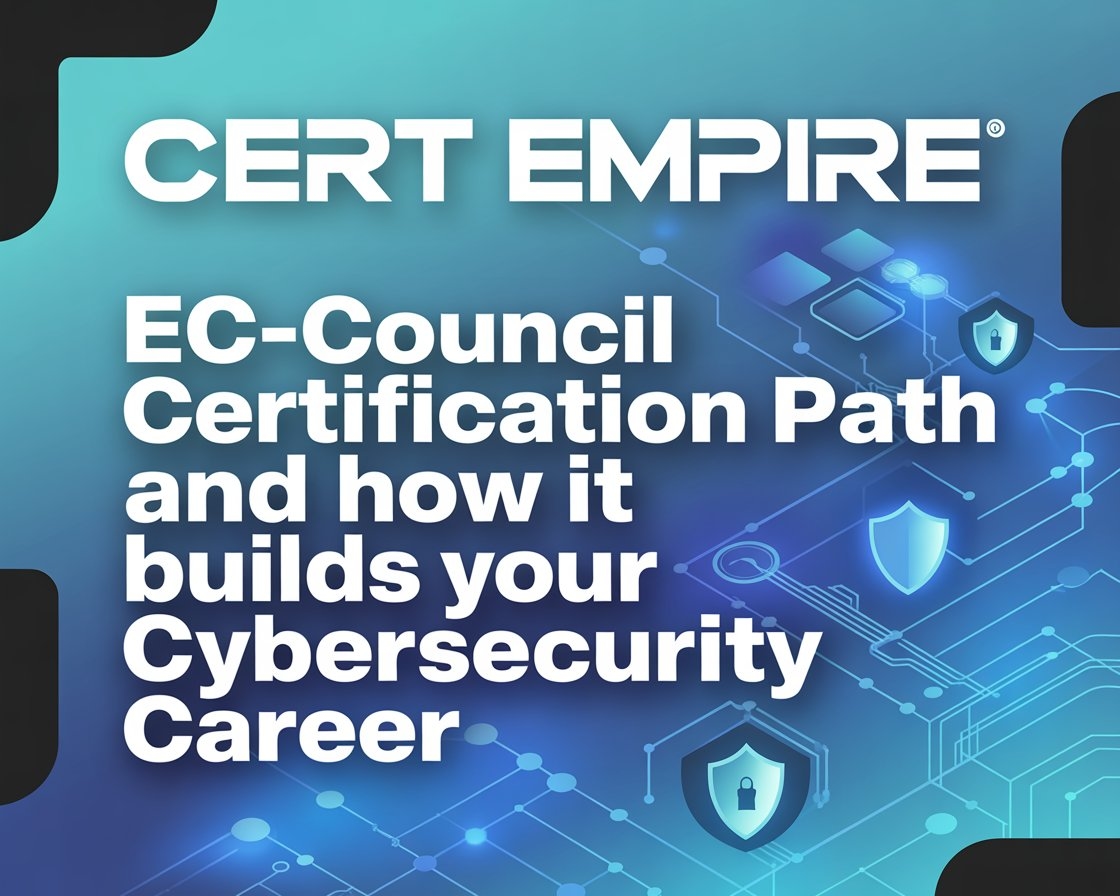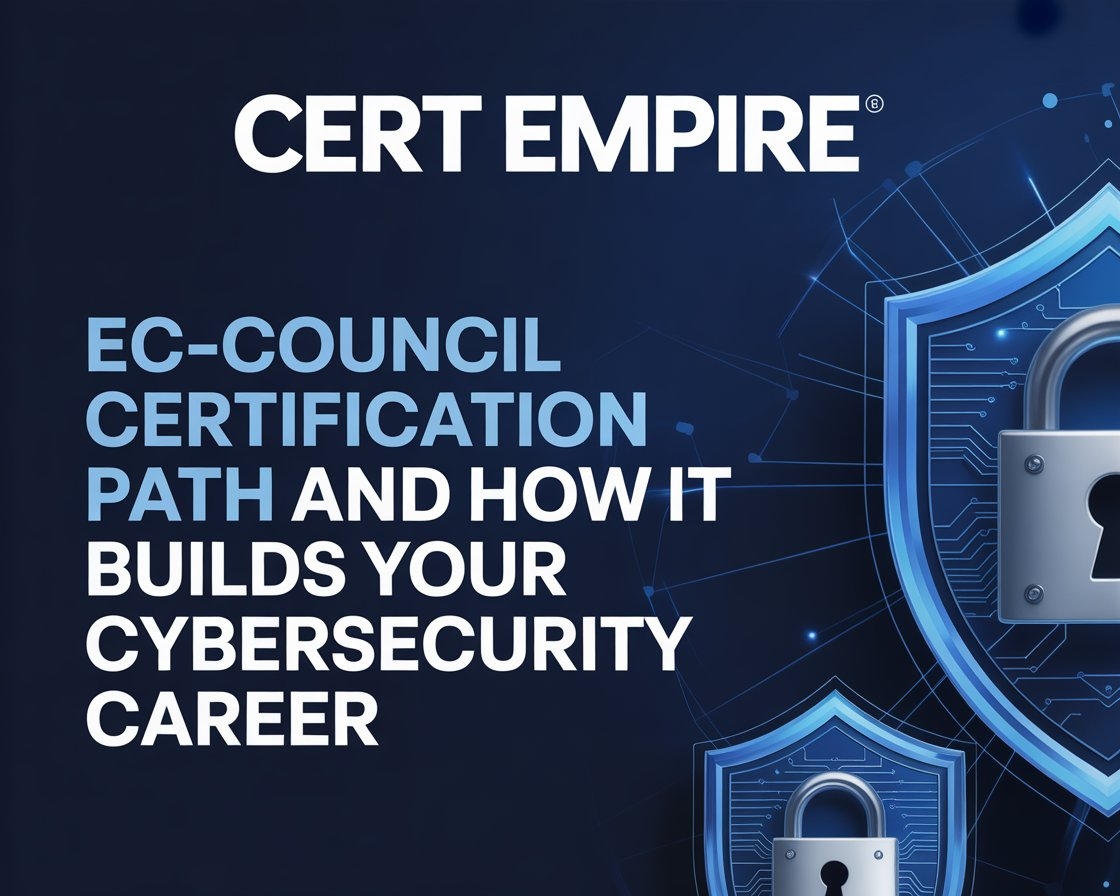In an era where cyber threats are more sophisticated than ever, organizations need professionals who can protect their systems, data, and networks with precision. That’s exactly where the EC-Council Certification Path comes in, a globally recognized roadmap for cybersecurity specialists who want to build and validate their expertise at every level.
From entry-level technicians to elite ethical hackers, the EC-Council certification structure is designed to help professionals grow their careers through progressive stages of learning and skill validation. Let’s explore what makes this path one of the most respected in the world of cybersecurity.

What Is the EC-Council?
The International Council of E-Commerce Consultants (EC-Council) is a leading organization that develops globally recognized certifications in ethical hacking, information security, and cyber defense. Founded after the 9/11 cyberattacks, the EC-Council has become a trusted name in IT security education. Its goal is to equip professionals with the practical and theoretical skills needed to combat real-world cyber threats, from network breaches to ransomware attacks.
Overview of the EC-Council Certification Path
The EC-Council Certification Path is structured to guide learners from foundational security principles to advanced hacking and defense strategies. It offers multiple certifications tailored to different career levels, making it suitable for both beginners and experts.
The path generally follows these four stages:
Fundamental Level – Entry into Cybersecurity
This stage is perfect for beginners who want to understand the basics of cybersecurity, networks, and risk management.
Key certifications include:Certified Secure Computer User (CSCU)
Network Security Fundamentals (NSF)
EC-Council Certified Security Specialist (ECSS)
Intermediate Level – Building Core Skills
Once you’ve mastered the fundamentals, the next step is developing technical skills.
Popular certifications include:Certified Network Defender (CND)
Computer Hacking Forensic Investigator (CHFI)
Advanced Level – Ethical Hacking and Security Leadership
This is where the Certified Ethical Hacker (CEH) certification shines. It’s the most well-known EC-Council credential, focusing on penetration testing and ethical hacking methodologies.Expert Level – Mastering Cybersecurity Strategy
The final stage of the EC-Council Certification Path focuses on senior-level expertise.
Courses such as EC-Council Certified Security Analyst (ECSA) and Licensed Penetration Tester (LPT Master) validate deep technical knowledge and advanced security assessment abilities.
Each level builds on the last, ensuring that professionals gain not just credentials, but real, applicable skills.
Why Follow the EC-Council Certification Path?
The biggest advantage of following this certification roadmap is that it provides a structured learning journey tailored to your career stage. Whether you’re starting out or already managing complex systems, the EC-Council offers a program that fits. Employers around the world recognize its certifications as proof of professional competence, which helps candidates stand out in competitive job markets. Additionally, EC-Council certifications are ANSI-accredited, ensuring they meet global standards of quality and reliability. Graduates often move into high-demand roles such as penetration tester, forensic analyst, security consultant, or cyber defense engineer.
Certified Ethical Hacker (CEH) – The Flagship Credential
No discussion about the EC-Council Certification Path would be complete without mentioning the Certified Ethical Hacker (CEH). This certification is a must-have for anyone pursuing a career in ethical hacking. It teaches candidates to think like a hacker, understanding how cybercriminals exploit vulnerabilities so they can better defend against them. The CEH covers over 20 modules and 400 attack vectors, giving you deep insights into hacking tools, techniques, and countermeasures.
After CEH, many professionals move on to advanced programs like ECSA and LPT Master, which test your ability to perform complex penetration tests and vulnerability assessments in real-world environments.
Career Opportunities After EC-Council Certifications
Earning EC-Council certifications can open doors to a wide range of cybersecurity jobs. Some of the most common roles include:
Penetration Tester
Information Security Analyst
Incident Responder
Cybersecurity Consultant
Security Operations Center (SOC) Analyst
These roles often come with excellent pay and job stability. According to recent industry data, EC-Council-certified professionals can earn between $90,000 and $150,000 annually, depending on experience and specialization. Top employers like IBM, Cisco, Deloitte, and Lockheed Martin actively hire candidates with EC-Council credentials for critical security positions.
How to Prepare for EC-Council Exams
EC-Council exams are known for their technical depth, so preparation is essential. Candidates should focus on understanding both theory and hands-on practice. Training programs are available through Accredited Training Centers (ATCs), and many online platforms provide self-paced study materials.
Using practice tests, video tutorials, and exam dumps from reliable sources such as Cert Empire can make preparation smoother and more effective. These materials help you understand exam patterns, question logic, and time management techniques.
Renewal and Continuing Education
Most EC-Council certifications are valid for three years and require renewal through the EC-Council Continuing Education (ECE) program. To maintain your credentials, you’ll need to earn ECE credits by attending workshops, completing training sessions, or contributing to cybersecurity research.
This ensures that professionals stay up to date with the latest threats, defense tools, and technologies in an ever-changing industry.
Why EC-Council Certifications Stand Out
Unlike many IT certifications that focus narrowly on a single vendor or technology, the EC-Council Certification Path covers a broad range of cybersecurity domains. From ethical hacking to network defense, it’s a comprehensive framework that empowers you to understand cybersecurity holistically.
The certifications are recognized globally, respected by government agencies, and often listed as preferred qualifications in job postings. That makes them not only valuable learning tools but also strong career boosters.
Final Thoughts
The EC-Council Certification Path is more than a list of credentials; it’s a career roadmap for anyone serious about cybersecurity. Whether your goal is to become an ethical hacker, a security analyst, or a penetration tester, EC-Council certifications provide the credibility, knowledge, and hands-on skills to succeed. With trusted preparation resources like Cert Empire, you can study confidently, practice effectively, and pass your exams on the first try.
In a world where data is the new currency, EC-Council-certified professionals will always be in demand, protecting organizations, systems, and people from the invisible battles of the digital age.

